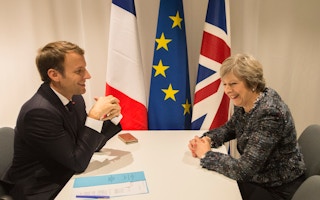France has few stronger allies on climate change than the United Kingdom.
Though separated by a small strip of water and heading into difficult debates over the future of our European Union relationship, on climate change we are as one.
Leaders in Paris and London have, for the past three decades, ensured global efforts to tackle this most serious of problems have delivered real dividends.
Since UK environment minister Michael Howard helped create the United Nations’ climate body in the late 1980s through to the Paris Climate Agreement in 2015, the Franco-British alliance has been critical to driving both European and international progress on this issue.
As France’s climate change and special representative hosting those 2015 talks, I knew I could rely on the UK Energy Secretary Amber Rudd when she was appointed to chair delicate finance negotiations in the closing days of the summit.
When European leaders needed to crank up the pressure on other countries to commit to more ambitious measures in Paris, I knew the UK would deliver.
British and French expertise at the climate talks is unmatched.
The UK’s Climate Change Act - celebrating its 10th birthday this year - set the benchmark for countries across the planet to follow.
The financial contributions from France and the UK to help developing countries cope with extreme weather are among the most generous of any country: both pledged more than $1 billion to the U.N.’s Green Climate Fund.
UK and French support for the Intergovernmental Panel on Climate Change is crucial to counter the damaging cuts imposed by President Trump to the Nobel Prize winning institution/in a year in which it will assess ways for the world to keep warming to 1.5°C by 2100.
Critically, governments on both sides of the English Channel are taking steps to ensure the trillions of private sector funds are aligned with the Paris Agreement.
Now we are seeing both countries take a new and ambitious step towards zero carbon economies: France will phase out coal from its power sector by 2022, the UK by 2025.
“
There are, it is true, certain leaders with their heads stuck in the sand, their minds stuck in the past, their vision blunted by greed and lack of foresight.
This is leadership from Emmanuel Macron and Theresa May that should be applauded, as should their commitment to encourage others to do the same through their global initiative, the Powering Past Coal Alliance.
This is all testament to what our two countries can achieve when we work together, and when it comes to climate and energy we have no choice.
The impacts of a warming world will hit both our countries hard if left unchecked. As Governor Mark Carney has warned, business supply chains are at risk and our financial powerhouses in London and Paris are particularly exposed to climate shocks. Yet, as ever, it is the poorest who face the greatest risks.
It’s why French insurer AXA, which employs well over 10,000 staff in the UK, announced in 2017 that it deemed coal investments too risky and would divest existing holdings.
It’s why carmakers on both sides of the channel are channeling millions into investments in cleaner electric cars.
It’s why the Mayors of Paris and London, Anne Hidalgo and Sadiq Khan, are partnering to explore solutions to the air pollution crisis that is blighting both our capitals.
And it’s why UK and French diplomats are working closely together on the possibility of a new global climate deal for the shipping sector, due to be announced in April this year.
Beyond our shared diplomatic efforts, we are also cooperating more directly through under-sea power cables that can help both our countries reduce the burden of energy costs for households and businesses, and make going green easier and cheaper. It is crucial that the Brexit negotiations do not put at risk this practical cooperation.
Today’s meeting of Macron and May offers the opportunity to show that the partnership between our countries, built on a common understanding that tackling climate change is an economic and environmental necessity, will withstand the uncertain times ahead.
Low-carbon growth is the foundation upon which both our economies will move forward, with cities where children can breathe freely, new forests to offer home for wildlife, and the development of new technologies that will make a carbon-neutral world by 2050 a reality.
All G7 countries have grown their economies: most have cut emissions. There are, it is true, certain leaders with their heads stuck in the sand, their minds stuck in the past, their vision blunted by greed and lack of foresight. Fortunately, in Macron and May we have leaders who appreciate the severe dangers ahead if we allow atmospheric warming to go unchecked.
We are both at our best when we align our international diplomacy with the global interest.
In a year where we need all countries to up their game, these two great diplomatic powers should lead together to generate the new momentum we so desperately need to reach climate safety.
Laurence Tubiana is chief executive of the European Climate Foundation and was an architect of the 2015 U.N. Paris Agreement on Climate Change. This article is republished from Thomson Reuters Foundation.











